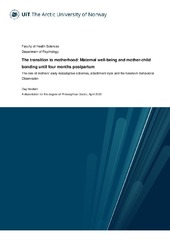| dc.contributor.advisor | Wang, Catharina E A | |
| dc.contributor.author | Nordahl, Dag | |
| dc.date.accessioned | 2023-08-28T12:06:57Z | |
| dc.date.available | 2023-08-28T12:06:57Z | |
| dc.date.issued | 2023-09-21 | |
| dc.description.abstract | In this thesis, it was investigated whether mothers` EMSs would predict maternal-fetal bonding quality during pregnancy (paper 1), whether attachment style would be associated with mother-infant bonding quality after birth (paper 2), and if these relations were mediated by symptoms of depression (paper 1) and parenting stress (paper 2). EMSs and anxious and avoidant attachment styles may be thought of as vulnerability factors for these relationships. In addition, we wanted to investigate whether a short intervention, the NBO, was associated with better maternal well-being postpartum, the quality of the mother’s relationship to the infant, and mothers’ experiences of postpartum follow-up care. The results show that EMSs, especially from the domain of disconnection and rejection domain, was related to poorer maternal-fetal bonding. Maternal symptoms of depression were found to mediate the relationship between EMSs and maternal-fetal bonding. Maternal attachment style, especially attachment avoidance, was related to poorer mother-infant bonding. Parenting stress mediated the relationship between attachment style and mother-infant bonding. Receiving the NBO-intervention was not associated with lower levels of maternal depressive symptoms and parenting stress, nor with stronger mother-infant bonding, better reflective functioning, or higher maternal confidence. However, the NBO was associated with increased knowledge about the infant`s signals. There may be limited benefits of the NBO in a well-functioning population of new mothers. The results on EMSs and adult attachment styles may have implications for identification of mothers at risk of bonding difficulties to their unborn child and their infant. | en_US |
| dc.description.doctoraltype | ph.d. | en_US |
| dc.description.popularabstract | The transition to motherhood may be experienced as overwhelming and difficult by many women. The present thesis explores factors that may be associated with maternal well-being and with mothers’ relationship to the fetus/infant. It is based on self-report data and has a special focus on how mothers’ early maladaptive schemas (EMSs), their adult attachment style and a short intervention, the Newborn Behavioral Observation, which aims to sensitize mothers to infants’ signals and needs, are related to parenting stress, symptoms of depression and the mother-infant and mother-fetus relationship. The thesis is part of a Tromsø population-based study (the NorBaby study) and is designed as a prospective longitudinal study following prospective mothers from pregnancy and until a mean of four months postdelivery, and the intervention part of the study was designed as a non-randomized cluster-controlled design.
The purpose of the present thesis was: 1) to examine the association between mothers` EMSs and maternal-fetal bonding during pregnancy. Further, to explore symptoms of depression as a mediator in this association, 2) to explore the association between mothers` attachment styles and the quality of maternal infant bonding around six weeks postpartum. Further, to investigate parenting stress as a mediator of the association between adult attachment style and mother-infant bonding, and 3) to evaluate the NBO as a universal preventive intervention within the regular well-baby clinic service. We investigated whether receiving the NBO was associated with maternal symptoms of depression and parenting stress, mother-infant bonding, maternal confidence, reflective functioning, and satisfaction with and benefit from postpartum follow-up care.
Results indicate that EMSs, especially from the domain of disconnection and rejection domain, was related to poorer maternal-fetal bonding. Maternal symptoms of depression were found to mediate the relationship between EMSs and maternal-fetal bonding. Maternal attachment style, especially attachment avoidance, was related to poorer mother-infant bonding. Parenting stress mediated the relationship between attachment style and mother-infant bonding. Receiving the NBO-intervention was not associated with lower levels of maternal depressive symptoms and parenting stress, nor with stronger mother-infant bonding, better reflective functioning, or higher maternal confidence. However, the NBO was associated with increased knowledge about the infant`s signals. There may be limited benefits of the NBO in a well-functioning population of new mothers. The results on EMSs and adult attachment styles may have implications for identification of mothers at risk of bonding difficulties to their unborn child and their infant. | en_US |
| dc.description.sponsorship | UiT Norges arktiske universitet | en_US |
| dc.identifier.uri | https://hdl.handle.net/10037/30481 | |
| dc.language.iso | eng | en_US |
| dc.publisher | UiT The Arctic University of Norway | en_US |
| dc.publisher | UiT Norges arktiske universitet | en_US |
| dc.relation.haspart | <p>Paper 1: Nordahl, D., Høifødt, R.S., Bohne, A., Landsem, I.P., Wang, C.E.A. & Thimm, J.C. (2019). Early maladaptive schemas as predictors of maternal bonding to the unborn child. <i>BMC Psychology, 7</i>(1), 23. Also available in Munin at <a href=https://hdl.handle.net/10037/16407>https://hdl.handle.net/10037/16407</a>.
<p>Paper 2: Nordahl. D., Rognmo, K., Bohne, A., Landsem, I.P., Moe, V., Wang, C.E.A & Høifødt, R.S. (2020). Adult attachment style and maternal-infant bonding: the indirect path of parenting stress. <i>BMC Psychology, 8</i>, 58. Also available in Munin at <a href=https://hdl.handle.net/10037/18533>https://hdl.handle.net/10037/18533</a>.
<p>Paper 3: Høifødt, R.S., Nordahl. D., Landsem, I.P., Csifcsak, G., Bohne, A., Pfuhl, G., Rognmo, C., Braarud, H.C., Goksøyr, A., Moe, V., Slinning, K. & Wang, C.E.A. (2020). Newborn Behavioral Observation, maternal stress, depressive symptoms, and the mother-infant relationship: results from the Northern Babies Longitudinal Study (NorBaby). <i>BMC Psychiatry, 20</i>, 300. Also available in Munin at <a href=https://hdl.handle.net/10037/18671>https://hdl.handle.net/10037/18671</a>. | en_US |
| dc.rights.accessRights | openAccess | en_US |
| dc.rights.holder | Copyright 2023 The Author(s) | |
| dc.rights.uri | https://creativecommons.org/licenses/by-nc-sa/4.0 | en_US |
| dc.rights | Attribution-NonCommercial-ShareAlike 4.0 International (CC BY-NC-SA 4.0) | en_US |
| dc.subject | VDP::Samfunnsvitenskap: 200::Psykologi: 260 | en_US |
| dc.subject | VDP::Social science: 200::Psychology: 260 | en_US |
| dc.title | The transition to motherhood: Maternal well-being and mother-child bonding until four months postpartum. The role of mothers’ early maladaptive schemas, attachment style and the Newborn Behavioral Observation | en_US |
| dc.type | Doctoral thesis | en_US |
| dc.type | Doktorgradsavhandling | en_US |


 English
English norsk
norsk
